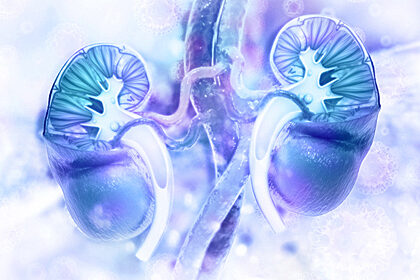Keeping Your Kidneys in Tip-Top Condition

More than 30 million adults in the U.S. are diagnosed with kidney disease, and UF Health is committed to raising awareness about prevention. While only about the size of your fist, your kidneys perform vital functions for the body. Most people know they make urine, which extracts extra water and waste from your system. However, the kidneys also control your body’s chemical balance, blood pressure and red blood cell production. About 14% of the U.S. population experiences chronic kidney disease, which is a condition that impairs kidney function and affects around 850 million people worldwide.
Kidney disease is known as a “silent killer” because people often do not experience any signs or symptoms until the disease has advanced. According to Mark Segal, M.D., Ph.D., chief of UF Health’s division of nephrology, hypertension and renal transplantation, patients can lose 50% or more of their kidney function without even knowing it.
Diabetes, hypertension and family history relating to kidney failure are the most common risk factors of kidney disease. Racial disparities in the disease have shown Hispanics and Native Americans are at a higher risk for kidney disease due to increased frequency of diabetes and high blood pressure. African Americans are at higher risk due to increased frequency of diabetes, high blood pressure and genetic risk factors.
“Once you develop kidney insufficiency, you are much more susceptible to cardiovascular disease,” said Segal, an associate professor in the UF College of Medicine. “It’s important for everyone to take preventive measures and modifications to maintain health.”
At UF Health, our team offers access to subspecialty nephrology practices to ensure patients are treated by doctors with expertise in their specific condition. Physicians in these specialty areas diagnose the underlying cause of hypertension and provide specific treatment for acute kidney injury, which is the rapid loss of kidney function.
“Acute kidney injury can occur during hospitalization due to other conditions the patient may have experienced,” Segal said. “Having suffered from acute kidney injury, you are at higher risk of further kidney damage and cardiovascular disease. The physicians in this practice can stratify your risk and treat to minimize the possibility of further consequences.”
These practices help address all risk factors for the patient and determine treatment based on specific symptoms. UF Health is ranked by U.S. News & World Report as one of the nation’s top hospitals for nephrology. While kidney disease can be intimidating, there are many ways to help prevent it. Maintaining a balanced lifestyle through regular physical activity and healthy food choices is one of the best ways to keep your kidneys healthy. Foods that are high in antioxidants, vitamins or nutrients, such as apples, blueberries or salmon, are beneficial for kidney health.
Getting tested is essential to check on your kidney health. One of the easiest tests is measuring your blood pressure, which can be done quickly at your local drugstore. Other blood and urine tests can be handled by your primary care provider. This month, make it your priority to stay on top of your kidney health by getting tested and improving your lifestyle.
About the author
